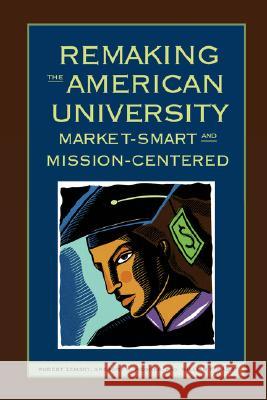Remaking the American University: Market-Smart and Mission-Centered » książka
Remaking the American University: Market-Smart and Mission-Centered
ISBN-13: 9780813536248 / Angielski / Twarda / 2005 / 224 str.
At one time, universities educated new generations and were a source of social change. Today, colleges and universities are less places of public purpose than agencies of personal advantage. Remaking the American University provides a penetrating analysis of the ways market forces have shaped and distorted the behaviors, purposes, and ultimately the missions of universities and colleges over the past half-century. The authors describe how a competitive preoccupation with published rankings and markets has spawned an admissions arms race that drains institutional resources and energies. Equally revealing are their depictions of the ways faculty distance themselves from their universities, resulting in an increase in the number of administrators that contributes substantially to institutional costs. Other chapters focus on the impact of intercollegiate athletics on the educational mission, even among selective institutions; on the unforeseen result of higher education's "outsourcing" of a substantial share of the scholarly publication function to for-profit interests; and on the consequences of today's overzealous investments in e-learning. These trends raise the central question: Can universities and colleges today still choose to be places of public purpose? In the answers they provide, both sobering and enlightening, the authors underscore a consistent and powerful lesson--academic institutions cannot ignore the workings of the markets. The challenge ahead is to learn how to better use those markets for the greater public good. Robert Zemsky is a longtime professor at the University of Pennsylvania where he currently serves as the chair of the Learning Alliance. He has served as Penn's chief planning officer, as master of Hill College House, as the founding director of the Institute for Research on Higher Education, and as the codirector of the federal government's National Center on the Educational Quality of the Workforce. Gregory R. Wegner is the director of program development at the Great Lakes Colleges Association. He was the first and only managing editor of Policy Perspectives. William F. Massy is the president of the Jackson Hole Higher Education Group, Inc., and professor emeritus of higher education and business administration at Stanford University. In the 1970s and 1980s he held senior administrative positions at Stanford University, where he pioneered the use of financial management and planning tools that have become standards in higher education.











